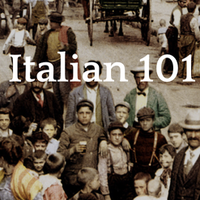1.2 Extended Reading for Mini Story - Il portafoglio
1.2 Erweiterte Lektüre für Mini Story - Das Portfolio
1.2 Εκτεταμένη ανάγνωση για το Mini Story - Το χαρτοφυλάκιο
1.2 Extended Reading for Mini Story - The wallet
1.2 Lectura ampliada para el minicuento - La cartera
1.2 Lecture approfondie de la mini-histoire - Le portfolio
1.2 Leitura alargada para o mini-conto - O portefólio
1.2 Mini Öykü için Genişletilmiş Okuma - Portföy
C'è una ragazza.
There is a girl.
Det er en jente.
Há uma rapariga.
Bir kız var.
Si chiama Janet.
Her name is Janet.
O seu nome é Janet.
Janet è statunitense.
Janet is from the United States.
Janet er fra USA.
Janet é natural dos Estados Unidos.
Janet è triste perché non ha il libro di italiano.
Janet is sad because she doesn't have an Italian book.
Janet üzgün çünkü İtalyanca kitabı yok.
Janet è in classe e aspetta la lezione.
Janet is in the classroom waiting for the lesson.
Janet ama il cinema.
Janet liebt Kino.
Janet loves cinema.
Janet sinemayı sever.
Janet studia l'italiano perché ama il cinema.
Janet studies Italian because she loves cinema.
Janet étudie l'italien parce qu'elle aime le cinéma.
Janet İtalyanca okuyor çünkü sinemayı seviyor.
Ma non ha il libro di testo.
But he doesn't have the textbook.
Ama ders kitabına sahip değil.
C'è un ragazzo.
There is a boy.
Si chiama Paulo Emilio.
His name is Paulo Emilio.
Paulo Emilio è brasiliano.
Paulo Emilio is Brazilian.
Emilio si siede vicino a Janet.
Emilio sits down next to Janet.
Emilio s'assoit à côté de Janet.
Emilio, Janet'in yanına oturur.
Emilio vede che Janet è triste.
Emilio sees that Janet is sad.
Emilio voit que Janet est triste.
Emilio, Janet'in üzgün olduğunu görür.
Emilio chiede a Janet: “Perché sei triste?”.
Emilio fragt Janet: "Warum bist du traurig?"
Emilio asks Janet: "Why are you sad?".
Emilio demande à Janet : "Pourquoi es-tu triste ?".
E Janet gli risponde: “Perché non ho il libro di italiano.
Und Janet antwortet: „Weil ich kein italienisches Buch habe.
And Janet replies: “Because I don't have an Italian book.
Et Janet répond : « Parce que je n'ai pas de livre italien.
Ve Janet cevaplıyor: "Çünkü İtalyanca kitabım yok.
Ho perso il portafoglio e non ho soldi per il libro.”
Ich habe meine Brieftasche verloren und ich habe kein Geld für das Buch. "
I lost my wallet and I have no money for the book. "
J'ai perdu mon portefeuille et je n'ai pas d'argent pour le livre."
Emilio ha il libro.
Emilio hat das Buch.
Emilio has the book.
Emilio condivide il libro con Janet.
Emilio shares the book with Janet.
Emilio dzieli się książką z Janet.
Emilio kitabı Janet ile paylaşır.
Janet è felice.
Janet is happy.
Paulo Emilio ama lo sport.
Paulo Emilio loves sports.
Paulo Emilio sporu sever.
Ama il beach volley, la pallavolo e il calcio.
Er liebt Beachvolleyball, Volleyball und Fußball.
He loves beach volleyball, volleyball and football.
Il aime le beach-volley, le volley-ball et le football.
Plaj voleybolu, voleybol ve futbolu seviyor.
Paulo Emilio studia l'italiano perché ama lo sport.
Paulo Emilio lernt Italienisch, weil er Sport liebt.
Paulo Emilio studies Italian because he loves sport.
Janet e Paulo Emilio diventano amici.
Janet and Paulo Emilio become friends.
Janet ve Paulo Emilio arkadaş olur.
C'è una ragazza.
There is a girl.
Si chiama Ingrid.
Her name is Ingrid.
Ingrid è tedesca.
Ingrid is German.
Ingrid ama l'arte.
Ingrid loves art.
Ingrid studia l'italiano perché ama l'arte.
Ingrid studies Italian because she loves art.
Ingrid va a lezione e trova un portafoglio.
Ingrid goes to class and finds a wallet.
Entra in classe e dice agli studenti: “Ho trovato un portafoglio!”
He enters the classroom and tells the students: "I found a wallet!"
Il entre dans la classe et dit aux élèves : « J'ai trouvé un portefeuille !
Sınıfa girer ve öğrencilere: "Bir cüzdan buldum!"
Ingrid mostra il portafoglio.
Ingrid shows her wallet.
Ingrid cüzdanını gösterir.
Janet dice: “È mio!
Janet sagt: „Es ist meins!
Janet says, “It's mine!
Janet, “Benim!
Grazie mille!
Thanks a lot!
Oh, sono tanto felice!”
Oh, I'm so happy! "
Oh, çok mutluyum! "
Ingrid dà a Janet il suo portafoglio.
Ingrid gives Janet her wallet.
Janet ha il suo portafoglio.
Janet has her wallet.
Janet'in cüzdanı var.
Janet è molto felice.
Janet is very happy.

